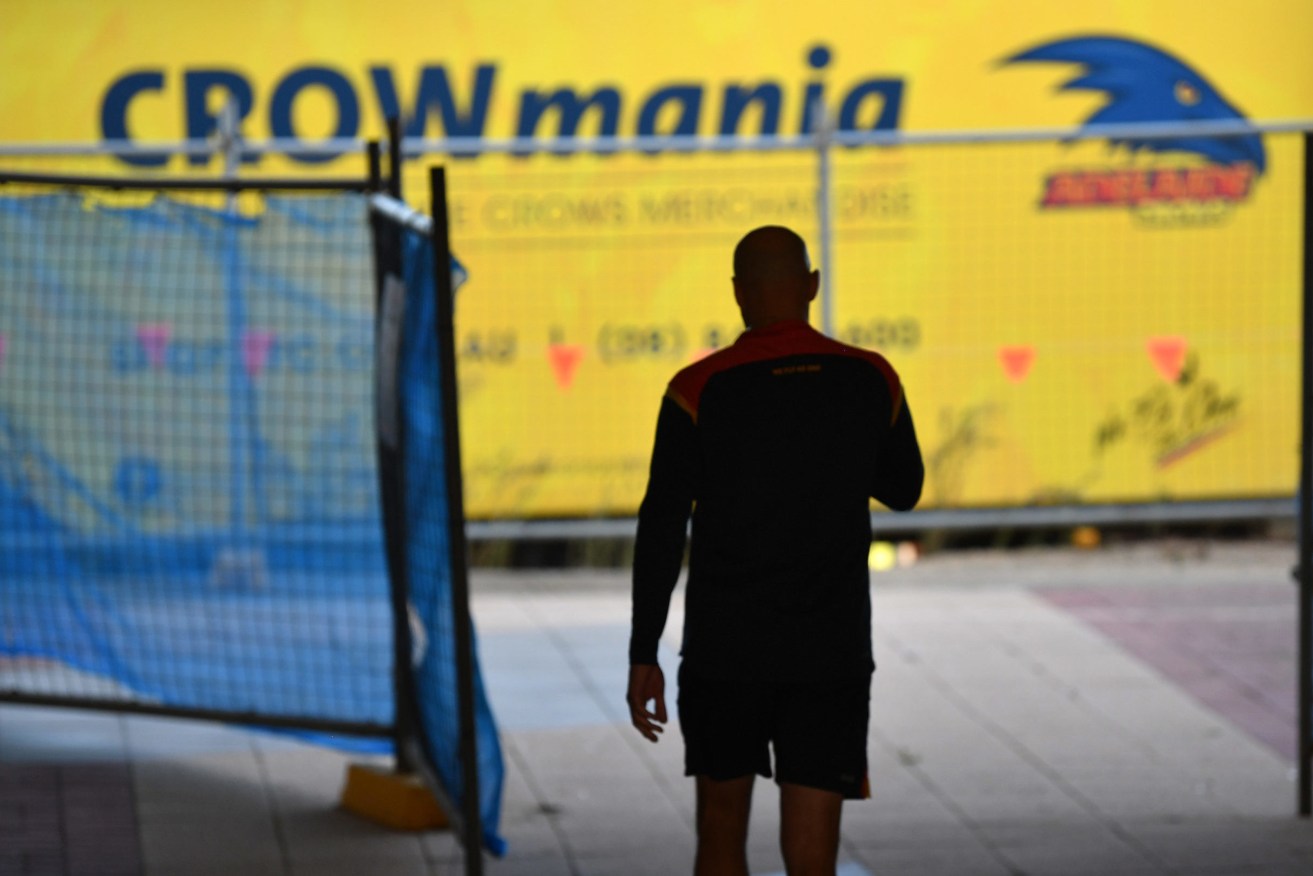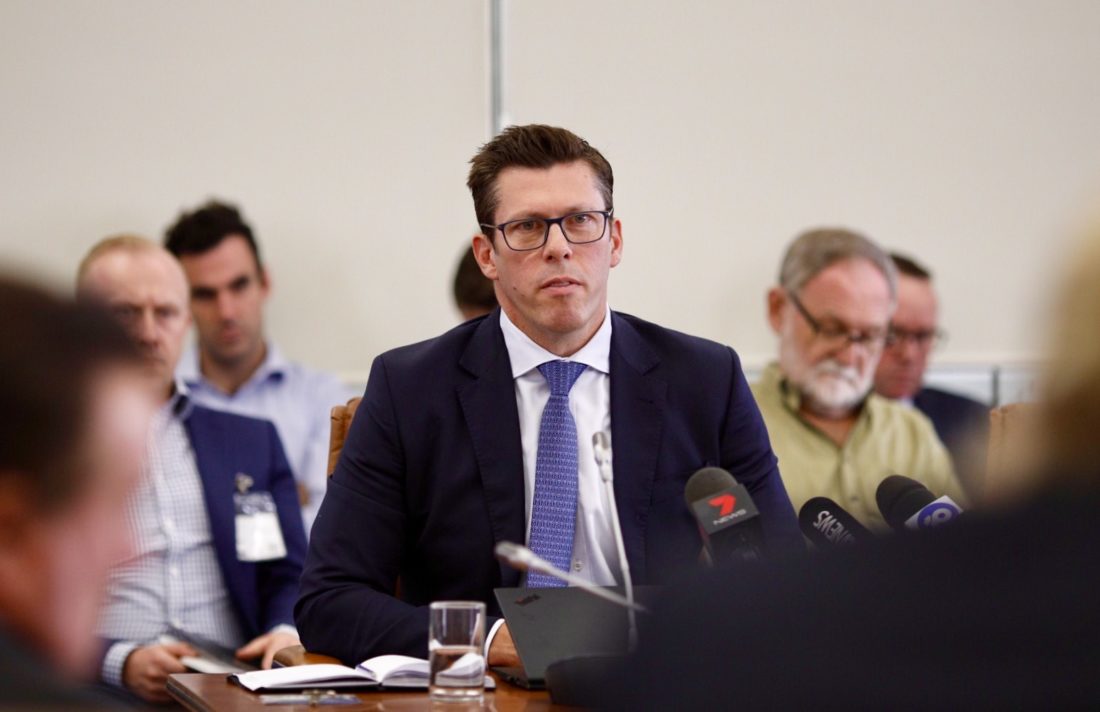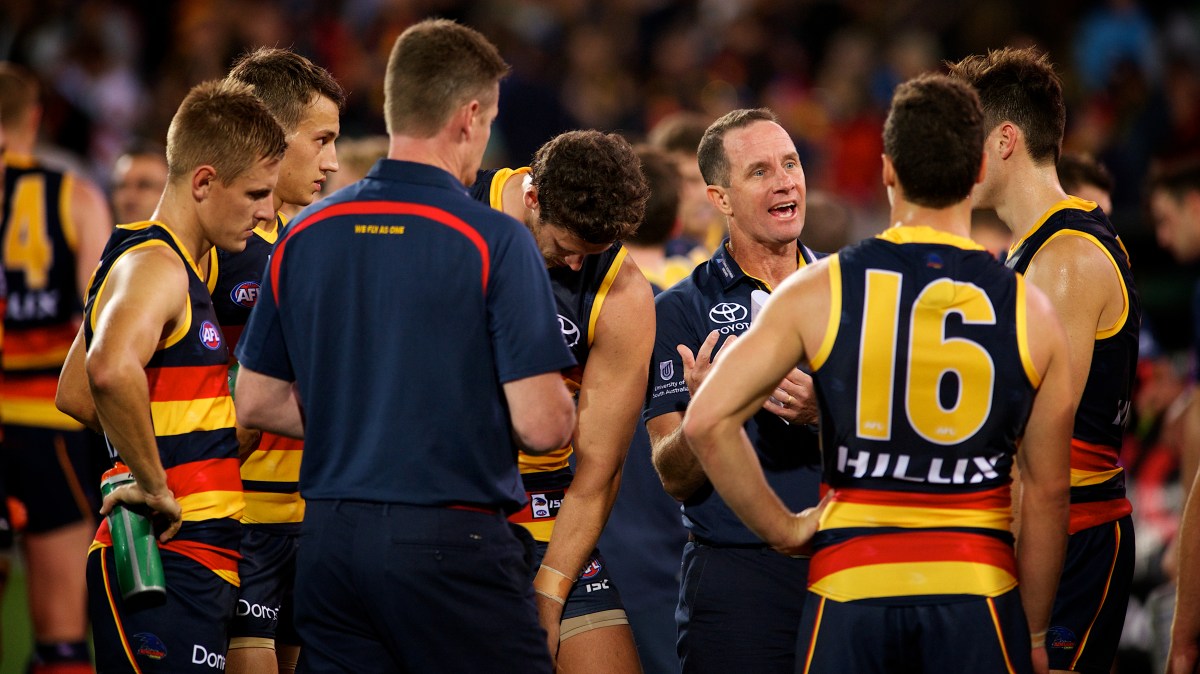Inside the Crows’ downfall: Rebuilding a team – and repairing a club
Never before in its 30 years as an AFL powerhouse has the Adelaide Football Club faced so many questions on its future. In the concluding part of his review, Michelangelo Rucci seeks some answers.


Crows coach Matthew Nicks at the clubs West Lakes training base. A move to the city is now likely to be years away. Photo: AAP/David Mariuz
No-one can forecast when or where this year’s AFL season will finish amid all the uncertainty posed by the COVID pandemic.
And this extends to 2021 for predictions on how the Adelaide Football Club will recast its failed football program and restructure its board room and front office – either by design from the new economy forced on a debt-loaded AFL or by the politics that shape football clubs.
Very clear, however, from the response to this InDaily series – and renewed calls for an independent investigation into the club’s failed pre-season camp on the Gold Coast early in 2018 run by third-party Collective Mind – is the need to not only “rebuild” a football team but also “repair” a football club.
Novice coach Matthew Nicks will need at least three years to re-establish Adelaide’s reputation as a competitive AFL team. He will need a stronger football department – and has conceded as much. He will need his current football staff to deliver with the rich cache of draft picks stored at West Lakes.
Off the field, it is far more complicated.
In the past 48 hours it has become clear the battle to refit the Crows boardroom – in particular, the chairman’s seat held by Rob Chapman since 2009 – has moved beyond the old guard that is lobbying for change… or a return to the past with Steven Trigg, as first reported by InDaily on Thursday.
Leading Adelaide lawyer Greg Griffin also wants change, not just of the club’s boardroom but also the Adelaide Football Club constitution that since 2014 has made the AFL the lone judge of a candidate’s merit.
Griffin backed Adelaide 36ers basketball owner Grant Kelley’s push to join the Crows board – with the eye to be Chapman’s successor – and has taken issue with how that move was blocked by the Adelaide Football Club nomination panel led by vice-chairman Jim Hazel.
Griffin believes that call belongs solely with the club’s members on a ballot paper. He also wants a “football person” to lead the board, as was the case with the late Bob Hammond and Bill Sanders before Chapman. He is prepared to nominate Norwood Football Club (SANFL) president and Campbelltown City Council chief executive Paul Di Iulio to replace Chapman.
Change could demand a new leader in the front office, one with significant football knowledge – such as current Brisbane football boss David Noble.
Di Iulio took the presidency at Norwood in February 2014. Contacted by InDaily today, he did not know he held Griffin’s endorsement to become an AFL club chairman and did not want to make a public comment.
In its 30 years in the national league, the Adelaide Football Club has prided its record of financial strength. Unlike other expansion clubs, including West Coast, it has never needed a bail-out package from AFL House.
The Adelaide Football Club closed its 2019 financial year with $2.8 million in cash, assets of $28.5 million, a loan of just $1, liabilities close to $20 million and equity of $8.6 million.
CLICK HERE TO READ RUCCI’S FULL FOUR-PART SERIES
In the best-case scenario, South Australia’s biggest sporting organisation – that extends from AFL to AFLW, SANFL, national baseball, eSports and a significant media division producing lifestyle programming – could take a $10 million hit.
The Crows will maintain their so-called independence – despite their AFL licence being owned by the AFL Commission in Melbourne – by refinancing with the Bendigo Bank rather than dipping into the AFL treasury.
The financial drain will end – for probably five years – any scheme for a major training-administrative base near the city, as was planned with a $65 million budget at the Adelaide Aquatic Centre at North Adelaide (had the Adelaide City Council approved the partnership). The long-term lease at Football Park, West Lakes – where the Crows maintain their administration and training base amid a construction site – runs until 2038.
As the AFL integrity unit learned from its first investigation, many Crows players are reluctant and feel ashamed to address the camp with another “third party”.
There is no certainty Adelaide will restore its place in the SANFL state league competition next year. The AFL is still to determine how many players the 18 national league clubs will have on their senior lists next season – a verdict that seriously influences whether the Crows can muster a SANFL team.
A return to farming out excess players to all eight “traditional SANFL club” – as was the case until 2014 – would challenge the fast-track process of developing the new draftees being called to Adelaide for Crows senior coach Matthew Nicks’ program. Rather than have one Crows-appointed SANFL coach working to Nicks’ agenda, Adelaide would be dealing with eight independent coaches. Some of these mentors would prefer to work on their own needs rather than those designed by the Adelaide football department.
The AFLW program can continue to the same budgets assigned in 2020. But the AFL campaign will take, by league orders to all 18 clubs, a $3 million cut forcing Adelaide to work harder with fewer resources.
And the Adelaide Football Club board – with or without a new chairman should Rob Chapman indeed step aside in October – has to reconsider the empire built since Andrew Fagan arrived from rugby in 2015 with expansion plans in baseball, eSports and the failed attempt to strike a partnership with national basketball franchise, the Adelaide 36ers.
Season 2021 – with financial pressure not only from COVID but also the lingering budget strains from the recent payouts to coach Don Pyke and football boss Brett Burton – could demand the Adelaide Football Club re-focus on a strong football plan.
While Fagan has made the Crows commercially stronger – with annual turnover of $58 million, including an extra $2 million from non-football enterprises – there is the criticism of the club being culturally weaker under his watch.
This certainly was noted in club legend Andrew McLeod’s recent outburst about the changes at the Crows since 2015 when Fagan arrived from Sydney via Canberra as Steven Trigg’s successor in the chief executive’s office at West Lakes.
McLeod insists the Adelaide Football Club – that has lost member-themed facilities such as the club museum at West Lakes in Fagan’s time – has cultural issues and needs change from the top.
“With my hand on my heart I just believe our club can be better and we should strive to be,” McLeod said. “(Change) has to be top-down. Let’s see those in charge or in the front office walk the walk and lead this change.”

CEO Andrew Fagan has focused on the club’s financial strength – but the time has come for a renewed football focus in the key position. Photo: Tony Lewis/InDaily
Change could demand a new leader in the front office, one with significant football knowledge – such as current Brisbane football boss David Noble, a former recruiting manager, assistant coach and football chief at the Adelaide Football Club. He intends to make his next football move to an AFL club chief executive portfolio. His return to Adelaide, after four years in Brisbane, would restore confidence among increasingly concerned Crows fans.
The COVID-19 pandemic makes it impossible to measure this discontent at the gates at Adelaide Oval. The Crows left Football Park at the end of 2013 with a record low average attendance figure – 33,613. They entered Adelaide Oval with that figure rising to 48,046 but poor on-field results – and a fear of supporters leaving their seats – led to the sacking of coach Brenton Sanderson, nine months after the Crows board extended his contract for two seasons.
Fagan once declared he would lose sleep if the Crows average attendance at Adelaide Oval slipped to less than 45,000. That happened for the first time last season (44,514) when coach Don Pyke – also months after getting a two-year contract extension – walked after conceding he was part of the problem and not the solution for an Adelaide team that had fallen from grand finalist in 2017 to miss the AFL top-eight finals in consecutive years by ranking 12th and 11th in 2018 and last season respectively.
Today, Adelaide is destined for its first wooden spoon in the club’s 30-year history. There is even the question: will Adelaide be winless, the first team to go without victory in a season since the competition went national in 1987 and since Fitzroy finished 0-18 in 1964?
“We will win a game, I am sure of that,” says Crows chairman Rob Chapman.
For on-field success, Crows premiership coach Malcolm Blight offers this plan: “One, draft. Two, recruiting. Full stop.”
This puts the scrutiny on list manager Justin Reid, who joined the club from player management ranks in December 2014. Already, Crows premiership captain Mark Bickley has turned the heat on Reid – and the question of whether he is the man to construct a new player list at West Lakes – by suggesting the Adelaide board should commission a review of his work. This would follow the external review of the football department last year led by former Hawthorn great Jason Dunstall.
The AFL also needs the Collective Mind saga to disappear, particularly when the league is being accused of a “cover-up” on its investigation of the 2018 pre-season camp.
There is no quick fix for Adelaide, not even with the No.1 draft pick and five top-20 draft calls this year. At best, the Adelaide rebuild could take three years. Perhaps five – and this would test the patience of the Crows wealthy backers, members and fans who are accustomed to competitive teams on the field rather than sides lauded for being gallant in defeat.
At AFL House in Melbourne – where league executives are well aware of the cost of football failure in South Australia after cleaning up the expensive fall-out at Port Adelaide in 2012 – there would be eagerness for a quick rebound from the Crows.
The AFL executives need Adelaide at least successful in home games at Adelaide Oval to hold up television ratings that are critical to funding the league’s battle against the heavy debt created by the COVID pandemic.
The AFL also needs the Collective Mind saga to disappear, particularly when the league is being accused of a “cover-up” on its investigation of the 2018 pre-season camp.
Don Pyke was the senior coach who, with football chief Brett Burton, engaged Collective Mind to challenge the Adelaide players in the untapped “mental space”. This was in response to their observation of the team’s collapse in the 2017 AFL grand final loss to Richmond at the MCG.
On ABC radio, as a special commentator for the Collingwood-Geelong game in Perth on Thursday night, Pyke said there is the need to clear away the camp fall-out “once and for all”.
“It’s a conversation that’s probably due with the club with how they want to address this once and for all,” Pyke said. “I think there’s also an issue at the moment with context around some that were done and the purpose behind those that probably hasn’t been tabled.”
Pyke, who is subject to a club-imposed confidentially agreement, insists the camp was designed with the right intentions but was not executed perfectly.

Crows coach Don Pyke says the club has to address the infamous camp, once and for all. Photo: Michael Errey/InDaily
Adelaide, the AFL and the players’ union, the AFL Players’ Association, has hoped to “move on” from the camp in November 2018 after putting in place new guidelines on how AFL clubs engage third parties for training and psychological programs.
But the Crows, league and union are about to lose control of this agenda. SA Premier Steven Marshall’s suggestion of having SafeWork SA investigate the camp is progressing towards the independent review many are seeking.
Certainly, one player from the camp wants this. He told InDaily: “My time (to tell all and hold Collective Mind and others to account) will eventually come.”
Many ask to see a “smoking gun” to clear away the mystery of the camp. As the AFL integrity unit learned from its first investigation, many Crows players are reluctant and feel ashamed to address the camp with another “third party”. It was the same with the union approach to the players.
The players involved take issue with how the bond of trust they had with Pyke and other senior Crows football staff was breached when those private details were passed to Collective Mind to design the bespoke program for the camp.
Pyke says the intent was sincere. But the execution “had some gaps and holes and mistakes were made”.
This week, InDaily has – with the insight of people closely attached to the club and experts in the game – detailed the challenges the Crows face today. It is clear the Adelaide Football Club will change from the fall-out of COVID and its on-field problems. How much change this involves will take some time to see.
For the rest of the AFL season, you can read news and insights from Michelangelo Rucci – SA’s most experienced and credible football writer – every Friday in InDaily.
Want to comment?
Send us an email, making it clear which story you’re commenting on and including your full name (required for publication) and phone number (only for verification purposes). Please put “Reader views” in the subject.
We’ll publish the best comments in a regular “Reader Views” post. Your comments can be brief, or we can accept up to 350 words, or thereabouts.




